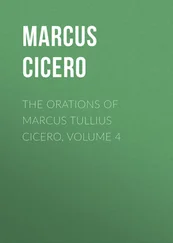Marcus Cicero - The Letters of Cicero, Volume 1
Здесь есть возможность читать онлайн «Marcus Cicero - The Letters of Cicero, Volume 1» — ознакомительный отрывок электронной книги совершенно бесплатно, а после прочтения отрывка купить полную версию. В некоторых случаях можно слушать аудио, скачать через торрент в формате fb2 и присутствует краткое содержание. Жанр: foreign_antique, Философия, foreign_edu, на английском языке. Описание произведения, (предисловие) а так же отзывы посетителей доступны на портале библиотеки ЛибКат.
- Название:The Letters of Cicero, Volume 1
- Автор:
- Жанр:
- Год:неизвестен
- ISBN:нет данных
- Рейтинг книги:4 / 5. Голосов: 1
-
Избранное:Добавить в избранное
- Отзывы:
-
Ваша оценка:
- 80
- 1
- 2
- 3
- 4
- 5
The Letters of Cicero, Volume 1: краткое содержание, описание и аннотация
Предлагаем к чтению аннотацию, описание, краткое содержание или предисловие (зависит от того, что написал сам автор книги «The Letters of Cicero, Volume 1»). Если вы не нашли необходимую информацию о книге — напишите в комментариях, мы постараемся отыскать её.
The Letters of Cicero, Volume 1 — читать онлайн ознакомительный отрывок
Ниже представлен текст книги, разбитый по страницам. Система сохранения места последней прочитанной страницы, позволяет с удобством читать онлайн бесплатно книгу «The Letters of Cicero, Volume 1», без необходимости каждый раз заново искать на чём Вы остановились. Поставьте закладку, и сможете в любой момент перейти на страницу, на которой закончили чтение.
Интервал:
Закладка:
Now to return to private matters. "Teucris" has fulfilled her promise. 92Pray execute the commission you undertook. My brother Quintus, who purchased the remaining three-fourths of the house in the Argiletum for 725 sestertia (about £5,800), is now trying to sell his Tusculan property, in order to purchase, if he can, the town house of Pacilius. Make it up with Lucceius! I see that he is all agog to stand for the consulship. I will do my best. Be careful to let me know exactly how you are, where you are, and how your business goes on.
13 February.
XX (a i, 15)
TO ATTICUS (IN EPIRUS)
Rome, 15 March
b.c. 61, æt. 45
You have heard that my dearest brother Quintus has got Asia; for I do not doubt that rumour has conveyed the news to you quicker than a letter from any of us. Now then, considering how desirous of a good reputation he and I have ever been, and how unusually Philhellenic we are and have the reputation of being, and considering how many there are whose enmity we have incurred for the sake of the Republic, "call to mind all your valour," 93to secure us the praise and affection of all concerned. I will write at greater length to you on these points in the letter which I shall give to Quintus himself. 94Please let me know what you have done about the business I confided to you, and also in your own affair; for I have had no letter from you since you left Brundisium. I am very anxious to hear how you are.
15 March.
XXI (a i, 16)
TO ATTICUS
Rome (May)
b.c. 61, æt. 45
You ask me what has happened about the trial, the result of which was so contrary to the general expectation, and at the same time you want to know how I came to make a worse fight of it than usual. I will answer the last first, after the manner of Homer. 95The fact is that, so long as I had to defend the authority of the senate, 96I battled with such gallantry and vigour that there were shouts of applause and crowds round me in the house ringing with my praise. Nay, if you ever thought that I shewed courage in political business, you certainly would have admired my conduct in that cause. For when the culprit had betaken himself to public meetings, and had made an invidious use of my name, immortal gods! What battles! What havoc! What sallies I made upon Piso, Curio, on the whole of that set! How I fell upon the old men for their instability, on the young for their profligacy! Again and again, so help me heaven! I regretted your absence not only as the supporter of my policy, but as the spectator also of my admirable fighting. However, when Hortensius hit on the idea of a law as to the sacrilege being proposed by the tribune Fufius, in which there was no difference from the bill of the consul except as to the kind of jurymen—on that point, however, the whole question turned—and got it carried by sheer fighting, because he had persuaded himself and others that he could not get an acquittal no matter who were the jurymen, I drew in my sails, seeing the neediness of the jurors, and gave no evidence beyond what was so notorious and well attested that I could not omit it. 97Therefore, if you ask the reason of the acquittal—to return at length to the former of the two questions—it was entirely the poverty and low character of the jury. But that this was possible was entirely the result of Hortensius's policy. In his alarm lest Fufius should veto the law which was to be proposed in virtue of a senatorial decree, he failed to see that it was better that the culprit should be left under a cloud of disgrace and dishonour than that he should be trusted to the discretion of a weak jury. But in his passionate resentment he hastened to bring the case into court, saying that a leaden sword was good enough to cut his throat. But if you want to know the history of the trial, with its incredible verdict, it was such that Hortensius's policy is now blamed by other people after the event, though I disapproved of it from the first. When the rejection of jurors had taken place, amidst loud cheers and counter-cheers—the accuser like a strict censor rejecting the most worthless, the defendant like a kind-hearted trainer of gladiators all the best—as soon as the jury had taken their seats, the loyalists at once began to feel distrust. There never was a seedier lot round a table in a gambling hell. Senators under a cloud, equites out at elbows, tribunes who were not so much made of money as "collectors" of it, according to their official title. 98However, there were a few honest men in the panel, whom he had been unable to drive off it by rejection, and they took their seats among their uncongenial comrades with gloomy looks and signs of emotion, and were keenly disgusted at having to rub elbows with such rascals. Hereupon, as question after question was referred to the panel in the preliminary proceedings, the severity of the decisions passes belief: there was no disagreement in voting, the defendant carried none of his points, while the accuser got even more than he asked. He was triumphant. Need I say more? Hortensius would have it that he was the only one of us who had seen the truth. There was not a man who did not think it impossible for him to stand his trial without being condemned a thousand times over. Farther, when I was produced as a witness, I suppose you have been told how the shouts of Clodius's supporters were answered by the jury rising to their feet to gather round me, and openly to offer their throats to P. Clodius in my defence. This seemed to me a greater compliment than the well-known occasion when your fellow citizens 99stopped Xenocrates from taking an oath in the witness-box, or when, upon the accounts of Metellus Numidicus 100being as usual handed round, a Roman jury refused to look at them. The compliment paid me, I repeat, was much greater. Accordingly, as the jurymen were protecting me as the mainstay of the country, it was by their voices that the defendant was overwhelmed, and with him all his advocates suffered a crushing blow. Next day my house was visited by as great a throng as that which escorted me home when I laid down the consulship. Our eminent Areopagites then exclaimed that they would not come into court unless a guard was assigned them. The question was put to the whole panel: there was only one vote against the need of a guard. The question is brought before the senate: the decree is passed in the most solemn and laudatory terms: the jurymen are complimented: the magistrates are commissioned to carry it out: no one thought that the fellow would venture on a defence. "Tell me, ye Muses, now how first the fire befell!" 101You know Bald-head, the Nanneian millionaire, 102that panegyrist of mine, whose complimentary oration I have already mentioned to you in a letter. In two days' time, by the agency of a single slave, and one, too, from a school of gladiators, he settled the whole business—he summoned them to an interview, made a promise, offered security, paid money down. Still farther, good heavens, what a scandal! even favours from certain ladies, and introductions to young men of rank, were thrown in as a kind of pourboire to some of the jurors. Accordingly, with the loyalists holding completely aloof, with the forum full of slaves, twenty-five jurors were yet found so courageous that, though at the risk of their lives, they preferred even death to producing universal ruin. There were thirty-one who were more influenced by famine than fame. On seeing one of these latter Catulus said to him, "Why did you ask us for a guard? Did you fear being robbed of the money?" There you have, as briefly as I could put it, the nature of the trial and the cause of the acquittal.
Next you want to know the present state of public affairs and of my own. That settlement of the Republic—firmly established by my wisdom, as you thought, as I thought by God's—which seemed fixed on a sure foundation by the unanimity of all loyalists and the influence of my consulship—that I assure you, unless some God take compassion on us, has by this one verdict escaped from our grasp: if "verdict" it is to be called, when thirty of the most worthless and dissolute fellows in Rome for a paltry sum of money obliterate every principle of law and justice, and when that which every man—I had almost said every animal—knows to have taken place, a Thalna, a Plautus, and a Spongia, and other scum of that sort decide not to have taken place. However, to console you as to the state of the Republic, rascaldom is not as cheerful and exultant in its victory as the disloyal hoped after the infliction of such a wound upon the Republic. For they fully expected that when religion, morality, the honour of juries, and the prestige of the senate had sustained such a crushing fall, victorious profligacy and lawless lust would openly exact vengeance from all the best men for the mortification which the strictness of my consulship had branded in upon all the worst. And it is once more I—for I do not feel as if I were boasting vaingloriously when speaking of myself to you, especially in a letter not intended to be read by others—it was I once more, I say, who revived the fainting spirits of the loyalists, cheering and encouraging each personally. Moreover, by my denunciations and invectives against those corrupt jurors I left none of the favourers and supporters of that victory a word to say for themselves. I gave the consul Piso no rest anywhere, I got him deprived of Syria, which had been already plighted to him, I revived the fainting spirit of the senate and recalled it to its former severity. I overwhelmed Clodius in the senate to his face, both in a set speech, very weighty and serious, and also in an interchange of repartees, of which I append a specimen for your delectation. The rest lose all point and grace without the excitement of the contest, or, as you Greeks call it, the ἀγών. Well, at the meeting of the senate on the 15th of May, being called on for my opinion, I spoke at considerable length on the high interests of the Republic, and brought in the following passage by a happy inspiration: "Do not, Fathers, regard yourselves as fallen utterly, do not faint, because you have received one blow. The wound is one which I cannot disguise, but which I yet feel sure should not be regarded with extreme fear: to fear would shew us to be the greatest of cowards, to ignore it the greatest of fools. Lentulus was twice acquitted, so was Catiline, a third such criminal has now been let loose by jurors upon the Republic. You are mistaken, Clodius: it is not for the city but for the prison that the jurors have reserved you, and their intention was not to retain you in the state, but to deprive you of the privilege of exile. Wherefore, Fathers, rouse up all your courage, hold fast to your high calling. There still remains in the Republic the old unanimity of the loyalists: their feelings have been outraged, their resolution has not been weakened: no fresh mischief has been done, only what was actually existing has been discovered. In the trial of one profligate many like him have been detected."—But what am I about? I have copied almost a speech into a letter. I return to the duel of words. Up gets our dandified young gentleman, and throws in my teeth my having been at Baiæ. It wasn't true, but what did that matter to him? "It is as though you were to say," replied I, "that I had been in disguise!" "What business," quoth he, "has an Arpinate with hot baths?" "Say that to your patron," said I, "who coveted the watering-place of an Arpinate." 103For you know about the marine villa. "How long," said he, "are we to put up with this king?" "Do you mention a king," quoth I, "when Rex 104made no mention of you?" He, you know, had swallowed the inheritance of Rex in anticipation. "You have bought a house," says he. "You would think that he said," quoth I, "you have bought a jury." "They didn't trust you on your oath," said he. "Yes," said I, "twenty-five jurors did trust me, thirty-one didn't trust you, for they took care to get their money beforehand." Here he was overpowered by a burst of applause and broke down without a word to say.
Читать дальшеИнтервал:
Закладка:
Похожие книги на «The Letters of Cicero, Volume 1»
Представляем Вашему вниманию похожие книги на «The Letters of Cicero, Volume 1» списком для выбора. Мы отобрали схожую по названию и смыслу литературу в надежде предоставить читателям больше вариантов отыскать новые, интересные, ещё непрочитанные произведения.
Обсуждение, отзывы о книге «The Letters of Cicero, Volume 1» и просто собственные мнения читателей. Оставьте ваши комментарии, напишите, что Вы думаете о произведении, его смысле или главных героях. Укажите что конкретно понравилось, а что нет, и почему Вы так считаете.












